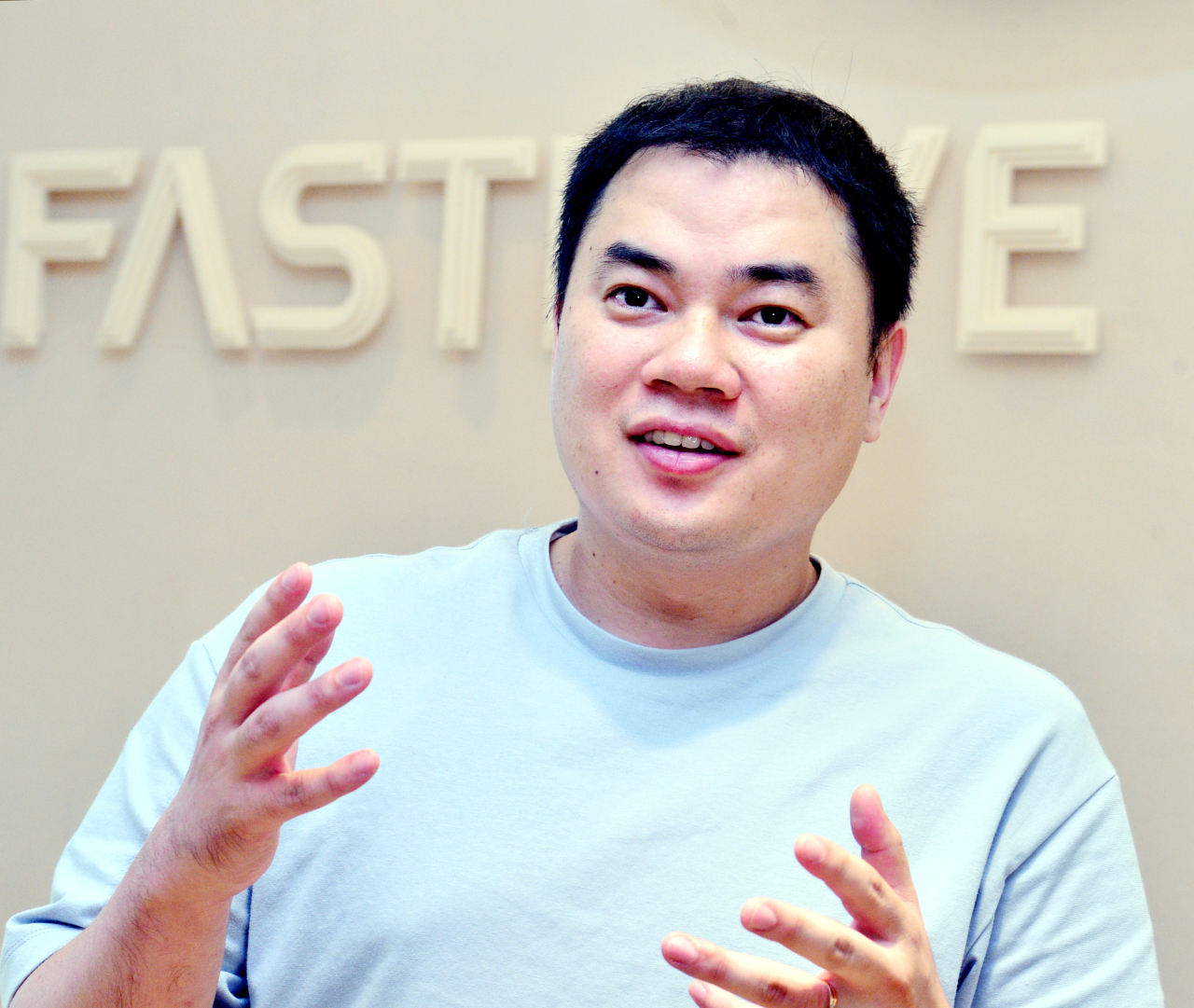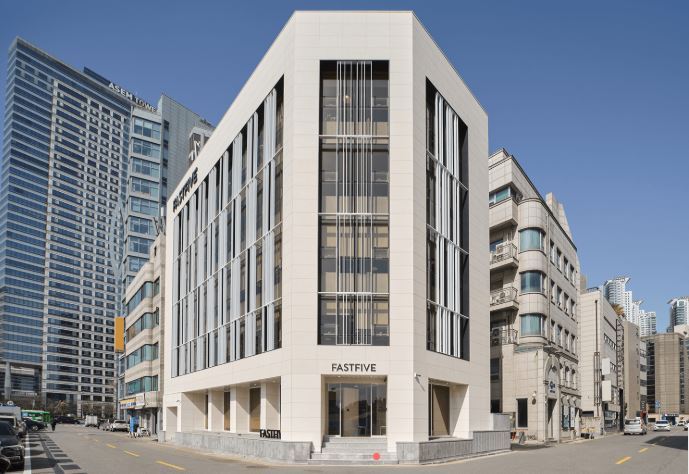[Herald Interview] Shared space operator FastFive turns to small buildings for sustainable profits
Founder sees fresh opportunity in growing trend toward satellite offices in pandemic era
By Son Ji-hyoungPublished : Aug. 23, 2020 - 15:00

Amid the growing need to have a fresh approach in the already saturated shared space industry, local company FastFive is turning to small commercial building landlords to minimize initial expenditures and build a sustainable profit structure.
Kim Dae-il, chief executive officer of FastFive, told The Korea Herald in a recent interview that the company is looking to forge more partnerships with landlords of small commercial buildings instead of signing long-term lease contracts with landmark buildings in Seoul and neighboring areas -- conventional methods that have been pursued by international shared space giants like WeWork.
FastFive does not sign a lease agreement with the landlord, but instead signs a partnership agreement that allows the operator to receive funding from the landlord, he said. The company uses the funds for various purposes, including upgrading the interior design of the leased space. Then, the operator manages the space and distributes the rental income from its tenants to the landlords. As a result, property owners receive the guaranteed portion of income monthly instead of a fixed rent under a conventional leasing agreement. FastFive offers five to 10 years for such partnerships.
“A partnership between a small commercial building owner and FastFive can be a win-win for both,” said Kim.
“The conventional leasing structure had allowed us to minimize vacancy in the space and stabilize cash flow, but the problem was the high capital expenditure when undertaking the new space.“
The asset-light structure, from FastFive’s perspective, allows the operator to achieve cost-efficiency by reducing the initial costs incurred by interior design or a lump sum of deposit payment for a conventional long-term deal.
The conventional deal refers to a long-term lease contract with large landmark buildings in the vicinity of main roads or public transit. Once the space operator manages to rent the space from its landlord involving fairly high initial expenditure, the operator is able to keep vacancies at a manageable level as an intermediary body between the landlord and temporary tenants. Tenants generate a stable income stream, which, minus rent to the landlord and other costs, translates into the operator‘s profit.
This popular leasing structure, however, has often resulted in an extravaganza for some operators, amid their heated race for economies of scale, by making the space more appealing to potential tenants, recruiting them and paying high rent to landmark building landlords. But the recent financial strain of industry giants like WeWork showed that the leasing agreement with operators for at least 10 years might not be as sustainable as it seems to the property owners.
Its partnership strategy involving small buildings could be a cure for the chronic vacancy rates that landlords suffer and a chance to raise property value under FastFive‘s brand name. Also, FastFive can prevent tenants from failing to pay rent on time, which has often been an issue for such landlords.
This, in turn, could benefit the domestic real estate ecosystem overall, Kim said.
“An owner of a small building distant from a main street has less bargaining power than those of a large building at a corner of the street when negotiating with tenants,” Kim said. “It might be better for landlords to take that approach than leave the space idle.”
Kim Dae-il, chief executive officer of FastFive, told The Korea Herald in a recent interview that the company is looking to forge more partnerships with landlords of small commercial buildings instead of signing long-term lease contracts with landmark buildings in Seoul and neighboring areas -- conventional methods that have been pursued by international shared space giants like WeWork.
FastFive does not sign a lease agreement with the landlord, but instead signs a partnership agreement that allows the operator to receive funding from the landlord, he said. The company uses the funds for various purposes, including upgrading the interior design of the leased space. Then, the operator manages the space and distributes the rental income from its tenants to the landlords. As a result, property owners receive the guaranteed portion of income monthly instead of a fixed rent under a conventional leasing agreement. FastFive offers five to 10 years for such partnerships.
“A partnership between a small commercial building owner and FastFive can be a win-win for both,” said Kim.
“The conventional leasing structure had allowed us to minimize vacancy in the space and stabilize cash flow, but the problem was the high capital expenditure when undertaking the new space.“
The asset-light structure, from FastFive’s perspective, allows the operator to achieve cost-efficiency by reducing the initial costs incurred by interior design or a lump sum of deposit payment for a conventional long-term deal.
The conventional deal refers to a long-term lease contract with large landmark buildings in the vicinity of main roads or public transit. Once the space operator manages to rent the space from its landlord involving fairly high initial expenditure, the operator is able to keep vacancies at a manageable level as an intermediary body between the landlord and temporary tenants. Tenants generate a stable income stream, which, minus rent to the landlord and other costs, translates into the operator‘s profit.
This popular leasing structure, however, has often resulted in an extravaganza for some operators, amid their heated race for economies of scale, by making the space more appealing to potential tenants, recruiting them and paying high rent to landmark building landlords. But the recent financial strain of industry giants like WeWork showed that the leasing agreement with operators for at least 10 years might not be as sustainable as it seems to the property owners.
Its partnership strategy involving small buildings could be a cure for the chronic vacancy rates that landlords suffer and a chance to raise property value under FastFive‘s brand name. Also, FastFive can prevent tenants from failing to pay rent on time, which has often been an issue for such landlords.
This, in turn, could benefit the domestic real estate ecosystem overall, Kim said.
“An owner of a small building distant from a main street has less bargaining power than those of a large building at a corner of the street when negotiating with tenants,” Kim said. “It might be better for landlords to take that approach than leave the space idle.”

Out of FastFive‘s 25 locations in Korea, the 22nd location in southern Seoul is controlled by FastFive through a partnership similar to the “managed services partnership” offered by Indonesian flexible space operator CoHive. Kim said FastFive plans to add three such locations by the end of 2020.
This comes in sync with FastFive’s aim to achieve moderate growth buoyed by constant demand that outpaces supply, he said.
The former investment manager at venture capital house Stonebridge Capital founded FastFive in 2015.
FastFive is the nation‘s leading shared working space operator by number of locations and the second-largest by gross leasable space, following WeWork Korea.
When asked about the coronavirus impact on the coworking space business, Kim said the pandemic, in fact, accelerated large corporations’ moves to adopt a futuristic work environment, by taking satellite offices into consideration and relocating to coworking spaces.
To such corporate clients including SK Telecom, FastFive‘s workplace-as-a-service solutions are nothing new, as coworking spaces were often more suitable for their temporary team projects, given that team’s size and active periods are highly subject to changes. The 36-year-old CEO also said FastFive could meet corporate clients’ demand to create their own shared working environments within their office space as their interior design capabilities could be outsourced.
FastFive eyes an initial public offering to become the first listed space operator among Asian rivals. It is awaiting preliminary approval for the stock flotation by the Korea Exchange. Last year FastFive recorded revenue of 42.5 billion won ($35.7 million) and an operating loss of 4.9 billion won.
“I believe FastFive has reached a second phase, where we not only serve those in our own space but also reach out to those in need of office solutions,” Kim said. “FastFive has sought to create a self-sufficient business model, and we are coming closer to that.”
By Son Ji-hyoung (consnow@heraldcorp.com)
This comes in sync with FastFive’s aim to achieve moderate growth buoyed by constant demand that outpaces supply, he said.
The former investment manager at venture capital house Stonebridge Capital founded FastFive in 2015.
FastFive is the nation‘s leading shared working space operator by number of locations and the second-largest by gross leasable space, following WeWork Korea.
When asked about the coronavirus impact on the coworking space business, Kim said the pandemic, in fact, accelerated large corporations’ moves to adopt a futuristic work environment, by taking satellite offices into consideration and relocating to coworking spaces.
To such corporate clients including SK Telecom, FastFive‘s workplace-as-a-service solutions are nothing new, as coworking spaces were often more suitable for their temporary team projects, given that team’s size and active periods are highly subject to changes. The 36-year-old CEO also said FastFive could meet corporate clients’ demand to create their own shared working environments within their office space as their interior design capabilities could be outsourced.
FastFive eyes an initial public offering to become the first listed space operator among Asian rivals. It is awaiting preliminary approval for the stock flotation by the Korea Exchange. Last year FastFive recorded revenue of 42.5 billion won ($35.7 million) and an operating loss of 4.9 billion won.
“I believe FastFive has reached a second phase, where we not only serve those in our own space but also reach out to those in need of office solutions,” Kim said. “FastFive has sought to create a self-sufficient business model, and we are coming closer to that.”
By Son Ji-hyoung (consnow@heraldcorp.com)








![[Kim Seong-kon] Democracy and the future of South Korea](http://res.heraldm.com/phpwas/restmb_idxmake.php?idx=644&simg=/content/image/2024/04/16/20240416050802_0.jpg&u=)








![[KH Explains] Hyundai's full hybrid edge to pay off amid slow transition to pure EVs](http://res.heraldm.com/phpwas/restmb_idxmake.php?idx=652&simg=/content/image/2024/04/18/20240418050645_0.jpg&u=20240418181020)

![[Today’s K-pop] Zico drops snippet of collaboration with Jennie](http://res.heraldm.com/phpwas/restmb_idxmake.php?idx=642&simg=/content/image/2024/04/18/20240418050702_0.jpg&u=)